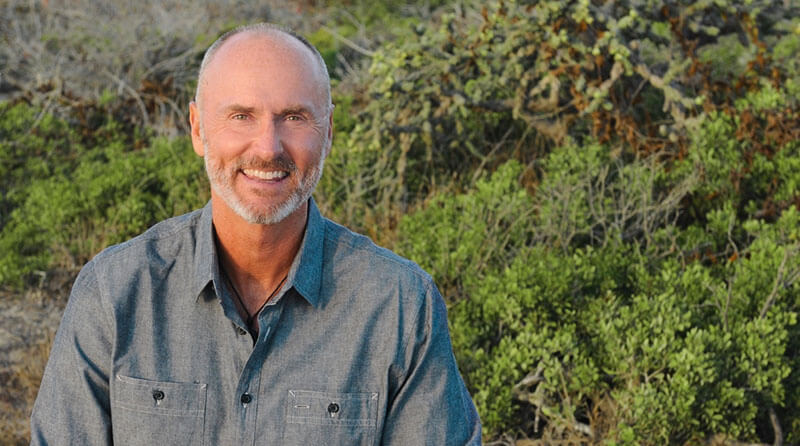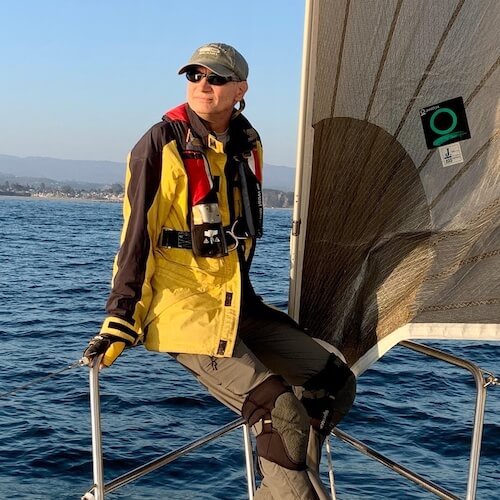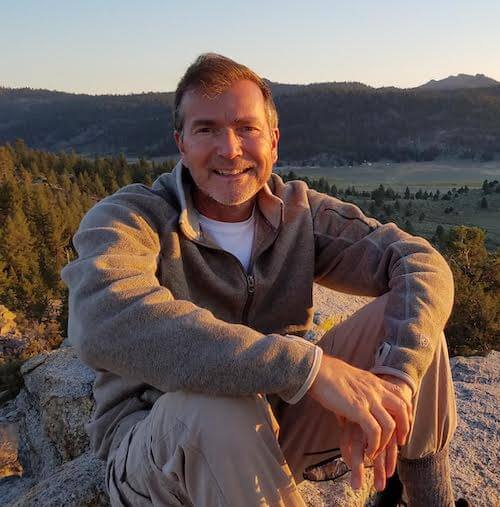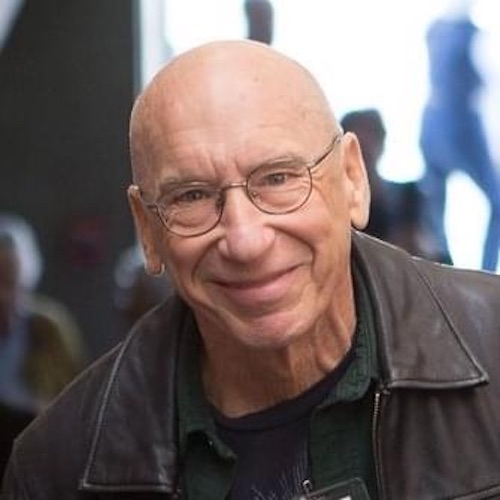
Wisdom, clarity, and joy. We can only hope for this much in our lives as we age, but sometimes those things seem unavailable or even unattainable when midlife questions present themselves, often manifesting as the infamous “midlife crisis.” Reframe. Midlife crisis is so very “out.”
Midlife transitions, during which we make choices that support ourselves and those we love, are so very “in.” This approach honors that we can make choices to shift with life’s stages.
Chip Conley is the founder of the Modern Elder Academy, the world’s first midlife wisdom school. He’s a longtime Esalen faculty member (you might also notice his name on the wall of the Esalen book store). His recent guest appearance on our social media talk show, Esalen Live!, with Christine Chen, focused on tackling your midlife transitions — not crises.
Observing National Healthy Aging Month in September, we’ve gathered some of Conley’s guidance from the interview to emphasize how we can navigate the stages of our lives. Did you know that midlife might actually start in our 30s?
Whether it’s time to start steering yourself toward wisdom, discovering clarity, or cultivating joy without guilt, we’re confident Conley’s insights will resonate with you.
Christine Chen: What’s the difference between midlife crisis and midlife transition?
Chip Conley: Midlife crisis as a term comes from 1965. There is evidence that people go through an awful lot of transitions between age 40 and age 70. You’re letting go of some things. No one ever schooled us on transitions.
Christine: When do we start to feel midlife transitions?
Chip: Change is situational and circumstantial. Transition is psychological and maybe even spiritual. When you’re going through transition you’re doing something fundamentally inside. You’re actually going through an emotional process of how you operate in the world — whether that’s your physical body, your career, your relationships, your connection to spirituality or religion.
Christine: Why is it important to cultivate wisdom and acknowledge this is happening?
Chip: What is wisdom… it’s just the pattern recognition you build up with experience. If you get better at understanding the experiences, and see, wow, I just learned a lesson there, that is the process of harvesting wisdom. It means you can see the future and your own patterns a little better and build your intuition — there’s a lot of evidence that wisdom and intuition have a lot in common.
Christine: When exactly does midlife begin?
Chip: Great question! In the past, midlife was perceived as 45 to 65. Today, many sociologists say it starts earlier — around 35 — because in some industries, you feel over the hill at 35. And then, people are living longer and working longer… and so some people feel like they’re still in midlife at 75. So, it’s possible that midlife has become a marathon from 35 to 75.
Christine: What transitional wisdom should we cultivate in our 30s?
Chip: I’m going to give suggestions for each of the decades, but what I say is relevant to all the decades. If you haven’t learned it before, 30s is when you want to learn something about mindfulness. It’s a door unlocking, allowing you to capture your wisdom and tap into it better. Nature, meditating, doing yoga, saying prayers, a gratitude journal… this is a good time to do it. The 30s is a time when your mind goes racing, and you get “monkey mind.” Slow your mind down and start observing yourself.
Christine: What do you suggest for the 40s?
Chip: For many people the 40s are their most difficult decade. It can be a really rough period, because you often feel like you’re carrying a big load. This is a decade to focus on “emotional insurance.” Surround yourself with people who create a “resilience circle” around you — like a peer-to-peer support. This is your crew, the people you consider your family. It could be a collection of people to help you build confidence in your career.
Christine: Let’s move onto the 50s.
Chip: You need to do your great “midlife edit.” It’s around your 50s you start to say, what is it I am ready to let go of… what are the mindsets, roles, obligations, archetypes I live out that I need to let go of? This is the time where we let go of the things we just don’t need anymore.
Christine: How about the 60s?
Chip: By your 60s, you’ve developed some amazing principles, wisdom, and learning along the way, but you also want to be someone with a beginners’ mind again. I became a mutual mentor with people half my age. At AirBnB, where I worked full-time for a few years, I taught them something and they taught me something. Often I would teach them something about EQ — emotional intelligence — and they would teach me something about DQ — digital intelligence. What a profound opportunity in our 60s to become mutual mentors with those younger than us.
Christine: Wisdom for the 70s?
Chip: It’s our 70s when we start to look at legacy. You’re generating things often for other generations. We move more into — how do I leave something to the world, whether it’s a memoir, or some way I’m going to volunteer for a cause, or how I create wisdom for grandchildren. They want to serve.
Christine: Is there anything different about midlife transitions in the pandemic?
Chip: Sometimes you could be going through transitions — career change, menopause, the sandwich generation (taking care of your parents while taking care of your kids) — and you feel you’re alone, like you’re doing the game of life wrong. You’re not doing it wrong. A lot of us are going through many transitions at once, and there are more transitions in midlife than any other life stage.
More insights in the full interview — watch here.

“Remembering to be as self compassionate as I can and praying to the divine that we're all a part of.”
–Aaron
“Prayer, reading, meditation, walking.”
–Karen
“Erratically — which is an ongoing stream of practice to find peace.”
–Charles
“Try on a daily basis to be kind to myself and to realize that making mistakes is a part of the human condition. Learning from our mistakes is a journey. But it starts with compassion and caring. First for oneself.”
–Steve
“Physically: aerobic exercise, volleyball, ice hockey, cycling, sailing. Emotionally: unfortunately I have to work to ‘not care’ about people or situations which may end painfully. Along the lines of ‘attachment is the source of suffering’, so best to avoid it or limit its scope. Sad though because it could also be the source of great joy. Is it worth the risk?“
–Rainer


“It's time for my heart to be nurtured on one level yet contained on another. To go easy on me and to allow my feelings to be validated, not judged harshly. On the other hand, to let the heart rule with equanimity and not lead the mind and body around like a master.”
–Suzanne
“I spend time thinking of everything I am grateful for, and I try to develop my ability to express compassion for myself and others without reservation. I take time to do the things I need to do to keep myself healthy and happy. This includes taking experiential workshops, fostering relationships, and participating within groups which have a similar interest to become a more compassionate and fulfilled being.“
–Peter


“Self-forgiveness for my own judgments. And oh yeah, coming to Esalen.”
–David B.
“Hmm, this is a tough one! I guess I take care of my heart through fostering relationships with people I feel connected to. Spending quality time with them (whether we're on the phone, through messages/letters, on Zoom, or in-person). Being there for them, listening to them, sharing what's going on with me, my struggles and my successes... like we do in the Esalen weekly Friends of Esalen Zoom sessions!”
–Lori

“I remind myself in many ways of the fact that " Love is all there is!" LOVE is the prize and this one precious life is the stage we get to learn our lessons. I get out into nature, hike, camp, river kayak, fly fish, garden, I create, I dance (not enough!), and I remain grateful for each day, each breath, each moment. Being in the moment, awake, and remembering the gift of life and my feeling of gratitude for all of creation.”
–Steven
“My physical heart by limiting stress and eating a heart-healthy diet. My emotional heart by staying in love with the world and by knowing that all disappointment and loss will pass.“
–David Z.
Today, September 29, is World Heart Day. Strike up a conversation with your own heart and as you feel comfortable, encourage others to do the same. As part of our own transformations and self-care, we sometimes ask for others to illuminate and enliven our hearts or speak our love language.
What if we could do this for ourselves too, even if just for today… or to start a heart practice, forever?
Christine Chen is a two-time Emmy winning journalist, best-selling author, California native, and senior teacher of yoga and Ayurveda.

Wisdom, clarity, and joy. We can only hope for this much in our lives as we age, but sometimes those things seem unavailable or even unattainable when midlife questions present themselves, often manifesting as the infamous “midlife crisis.” Reframe. Midlife crisis is so very “out.”
Midlife transitions, during which we make choices that support ourselves and those we love, are so very “in.” This approach honors that we can make choices to shift with life’s stages.
Chip Conley is the founder of the Modern Elder Academy, the world’s first midlife wisdom school. He’s a longtime Esalen faculty member (you might also notice his name on the wall of the Esalen book store). His recent guest appearance on our social media talk show, Esalen Live!, with Christine Chen, focused on tackling your midlife transitions — not crises.
Observing National Healthy Aging Month in September, we’ve gathered some of Conley’s guidance from the interview to emphasize how we can navigate the stages of our lives. Did you know that midlife might actually start in our 30s?
Whether it’s time to start steering yourself toward wisdom, discovering clarity, or cultivating joy without guilt, we’re confident Conley’s insights will resonate with you.
Christine Chen: What’s the difference between midlife crisis and midlife transition?
Chip Conley: Midlife crisis as a term comes from 1965. There is evidence that people go through an awful lot of transitions between age 40 and age 70. You’re letting go of some things. No one ever schooled us on transitions.
Christine: When do we start to feel midlife transitions?
Chip: Change is situational and circumstantial. Transition is psychological and maybe even spiritual. When you’re going through transition you’re doing something fundamentally inside. You’re actually going through an emotional process of how you operate in the world — whether that’s your physical body, your career, your relationships, your connection to spirituality or religion.
Christine: Why is it important to cultivate wisdom and acknowledge this is happening?
Chip: What is wisdom… it’s just the pattern recognition you build up with experience. If you get better at understanding the experiences, and see, wow, I just learned a lesson there, that is the process of harvesting wisdom. It means you can see the future and your own patterns a little better and build your intuition — there’s a lot of evidence that wisdom and intuition have a lot in common.
Christine: When exactly does midlife begin?
Chip: Great question! In the past, midlife was perceived as 45 to 65. Today, many sociologists say it starts earlier — around 35 — because in some industries, you feel over the hill at 35. And then, people are living longer and working longer… and so some people feel like they’re still in midlife at 75. So, it’s possible that midlife has become a marathon from 35 to 75.
Christine: What transitional wisdom should we cultivate in our 30s?
Chip: I’m going to give suggestions for each of the decades, but what I say is relevant to all the decades. If you haven’t learned it before, 30s is when you want to learn something about mindfulness. It’s a door unlocking, allowing you to capture your wisdom and tap into it better. Nature, meditating, doing yoga, saying prayers, a gratitude journal… this is a good time to do it. The 30s is a time when your mind goes racing, and you get “monkey mind.” Slow your mind down and start observing yourself.
Christine: What do you suggest for the 40s?
Chip: For many people the 40s are their most difficult decade. It can be a really rough period, because you often feel like you’re carrying a big load. This is a decade to focus on “emotional insurance.” Surround yourself with people who create a “resilience circle” around you — like a peer-to-peer support. This is your crew, the people you consider your family. It could be a collection of people to help you build confidence in your career.
Christine: Let’s move onto the 50s.
Chip: You need to do your great “midlife edit.” It’s around your 50s you start to say, what is it I am ready to let go of… what are the mindsets, roles, obligations, archetypes I live out that I need to let go of? This is the time where we let go of the things we just don’t need anymore.
Christine: How about the 60s?
Chip: By your 60s, you’ve developed some amazing principles, wisdom, and learning along the way, but you also want to be someone with a beginners’ mind again. I became a mutual mentor with people half my age. At AirBnB, where I worked full-time for a few years, I taught them something and they taught me something. Often I would teach them something about EQ — emotional intelligence — and they would teach me something about DQ — digital intelligence. What a profound opportunity in our 60s to become mutual mentors with those younger than us.
Christine: Wisdom for the 70s?
Chip: It’s our 70s when we start to look at legacy. You’re generating things often for other generations. We move more into — how do I leave something to the world, whether it’s a memoir, or some way I’m going to volunteer for a cause, or how I create wisdom for grandchildren. They want to serve.
Christine: Is there anything different about midlife transitions in the pandemic?
Chip: Sometimes you could be going through transitions — career change, menopause, the sandwich generation (taking care of your parents while taking care of your kids) — and you feel you’re alone, like you’re doing the game of life wrong. You’re not doing it wrong. A lot of us are going through many transitions at once, and there are more transitions in midlife than any other life stage.
More insights in the full interview — watch here.

“Remembering to be as self compassionate as I can and praying to the divine that we're all a part of.”
–Aaron
“Prayer, reading, meditation, walking.”
–Karen
“Erratically — which is an ongoing stream of practice to find peace.”
–Charles
“Try on a daily basis to be kind to myself and to realize that making mistakes is a part of the human condition. Learning from our mistakes is a journey. But it starts with compassion and caring. First for oneself.”
–Steve
“Physically: aerobic exercise, volleyball, ice hockey, cycling, sailing. Emotionally: unfortunately I have to work to ‘not care’ about people or situations which may end painfully. Along the lines of ‘attachment is the source of suffering’, so best to avoid it or limit its scope. Sad though because it could also be the source of great joy. Is it worth the risk?“
–Rainer


“It's time for my heart to be nurtured on one level yet contained on another. To go easy on me and to allow my feelings to be validated, not judged harshly. On the other hand, to let the heart rule with equanimity and not lead the mind and body around like a master.”
–Suzanne
“I spend time thinking of everything I am grateful for, and I try to develop my ability to express compassion for myself and others without reservation. I take time to do the things I need to do to keep myself healthy and happy. This includes taking experiential workshops, fostering relationships, and participating within groups which have a similar interest to become a more compassionate and fulfilled being.“
–Peter


“Self-forgiveness for my own judgments. And oh yeah, coming to Esalen.”
–David B.
“Hmm, this is a tough one! I guess I take care of my heart through fostering relationships with people I feel connected to. Spending quality time with them (whether we're on the phone, through messages/letters, on Zoom, or in-person). Being there for them, listening to them, sharing what's going on with me, my struggles and my successes... like we do in the Esalen weekly Friends of Esalen Zoom sessions!”
–Lori

“I remind myself in many ways of the fact that " Love is all there is!" LOVE is the prize and this one precious life is the stage we get to learn our lessons. I get out into nature, hike, camp, river kayak, fly fish, garden, I create, I dance (not enough!), and I remain grateful for each day, each breath, each moment. Being in the moment, awake, and remembering the gift of life and my feeling of gratitude for all of creation.”
–Steven
“My physical heart by limiting stress and eating a heart-healthy diet. My emotional heart by staying in love with the world and by knowing that all disappointment and loss will pass.“
–David Z.
Today, September 29, is World Heart Day. Strike up a conversation with your own heart and as you feel comfortable, encourage others to do the same. As part of our own transformations and self-care, we sometimes ask for others to illuminate and enliven our hearts or speak our love language.
What if we could do this for ourselves too, even if just for today… or to start a heart practice, forever?

Wisdom, clarity, and joy. We can only hope for this much in our lives as we age, but sometimes those things seem unavailable or even unattainable when midlife questions present themselves, often manifesting as the infamous “midlife crisis.” Reframe. Midlife crisis is so very “out.”
Midlife transitions, during which we make choices that support ourselves and those we love, are so very “in.” This approach honors that we can make choices to shift with life’s stages.
Chip Conley is the founder of the Modern Elder Academy, the world’s first midlife wisdom school. He’s a longtime Esalen faculty member (you might also notice his name on the wall of the Esalen book store). His recent guest appearance on our social media talk show, Esalen Live!, with Christine Chen, focused on tackling your midlife transitions — not crises.
Observing National Healthy Aging Month in September, we’ve gathered some of Conley’s guidance from the interview to emphasize how we can navigate the stages of our lives. Did you know that midlife might actually start in our 30s?
Whether it’s time to start steering yourself toward wisdom, discovering clarity, or cultivating joy without guilt, we’re confident Conley’s insights will resonate with you.
Christine Chen: What’s the difference between midlife crisis and midlife transition?
Chip Conley: Midlife crisis as a term comes from 1965. There is evidence that people go through an awful lot of transitions between age 40 and age 70. You’re letting go of some things. No one ever schooled us on transitions.
Christine: When do we start to feel midlife transitions?
Chip: Change is situational and circumstantial. Transition is psychological and maybe even spiritual. When you’re going through transition you’re doing something fundamentally inside. You’re actually going through an emotional process of how you operate in the world — whether that’s your physical body, your career, your relationships, your connection to spirituality or religion.
Christine: Why is it important to cultivate wisdom and acknowledge this is happening?
Chip: What is wisdom… it’s just the pattern recognition you build up with experience. If you get better at understanding the experiences, and see, wow, I just learned a lesson there, that is the process of harvesting wisdom. It means you can see the future and your own patterns a little better and build your intuition — there’s a lot of evidence that wisdom and intuition have a lot in common.
Christine: When exactly does midlife begin?
Chip: Great question! In the past, midlife was perceived as 45 to 65. Today, many sociologists say it starts earlier — around 35 — because in some industries, you feel over the hill at 35. And then, people are living longer and working longer… and so some people feel like they’re still in midlife at 75. So, it’s possible that midlife has become a marathon from 35 to 75.
Christine: What transitional wisdom should we cultivate in our 30s?
Chip: I’m going to give suggestions for each of the decades, but what I say is relevant to all the decades. If you haven’t learned it before, 30s is when you want to learn something about mindfulness. It’s a door unlocking, allowing you to capture your wisdom and tap into it better. Nature, meditating, doing yoga, saying prayers, a gratitude journal… this is a good time to do it. The 30s is a time when your mind goes racing, and you get “monkey mind.” Slow your mind down and start observing yourself.
Christine: What do you suggest for the 40s?
Chip: For many people the 40s are their most difficult decade. It can be a really rough period, because you often feel like you’re carrying a big load. This is a decade to focus on “emotional insurance.” Surround yourself with people who create a “resilience circle” around you — like a peer-to-peer support. This is your crew, the people you consider your family. It could be a collection of people to help you build confidence in your career.
Christine: Let’s move onto the 50s.
Chip: You need to do your great “midlife edit.” It’s around your 50s you start to say, what is it I am ready to let go of… what are the mindsets, roles, obligations, archetypes I live out that I need to let go of? This is the time where we let go of the things we just don’t need anymore.
Christine: How about the 60s?
Chip: By your 60s, you’ve developed some amazing principles, wisdom, and learning along the way, but you also want to be someone with a beginners’ mind again. I became a mutual mentor with people half my age. At AirBnB, where I worked full-time for a few years, I taught them something and they taught me something. Often I would teach them something about EQ — emotional intelligence — and they would teach me something about DQ — digital intelligence. What a profound opportunity in our 60s to become mutual mentors with those younger than us.
Christine: Wisdom for the 70s?
Chip: It’s our 70s when we start to look at legacy. You’re generating things often for other generations. We move more into — how do I leave something to the world, whether it’s a memoir, or some way I’m going to volunteer for a cause, or how I create wisdom for grandchildren. They want to serve.
Christine: Is there anything different about midlife transitions in the pandemic?
Chip: Sometimes you could be going through transitions — career change, menopause, the sandwich generation (taking care of your parents while taking care of your kids) — and you feel you’re alone, like you’re doing the game of life wrong. You’re not doing it wrong. A lot of us are going through many transitions at once, and there are more transitions in midlife than any other life stage.
More insights in the full interview — watch here.

“Remembering to be as self compassionate as I can and praying to the divine that we're all a part of.”
–Aaron
“Prayer, reading, meditation, walking.”
–Karen
“Erratically — which is an ongoing stream of practice to find peace.”
–Charles
“Try on a daily basis to be kind to myself and to realize that making mistakes is a part of the human condition. Learning from our mistakes is a journey. But it starts with compassion and caring. First for oneself.”
–Steve
“Physically: aerobic exercise, volleyball, ice hockey, cycling, sailing. Emotionally: unfortunately I have to work to ‘not care’ about people or situations which may end painfully. Along the lines of ‘attachment is the source of suffering’, so best to avoid it or limit its scope. Sad though because it could also be the source of great joy. Is it worth the risk?“
–Rainer


“It's time for my heart to be nurtured on one level yet contained on another. To go easy on me and to allow my feelings to be validated, not judged harshly. On the other hand, to let the heart rule with equanimity and not lead the mind and body around like a master.”
–Suzanne
“I spend time thinking of everything I am grateful for, and I try to develop my ability to express compassion for myself and others without reservation. I take time to do the things I need to do to keep myself healthy and happy. This includes taking experiential workshops, fostering relationships, and participating within groups which have a similar interest to become a more compassionate and fulfilled being.“
–Peter


“Self-forgiveness for my own judgments. And oh yeah, coming to Esalen.”
–David B.
“Hmm, this is a tough one! I guess I take care of my heart through fostering relationships with people I feel connected to. Spending quality time with them (whether we're on the phone, through messages/letters, on Zoom, or in-person). Being there for them, listening to them, sharing what's going on with me, my struggles and my successes... like we do in the Esalen weekly Friends of Esalen Zoom sessions!”
–Lori

“I remind myself in many ways of the fact that " Love is all there is!" LOVE is the prize and this one precious life is the stage we get to learn our lessons. I get out into nature, hike, camp, river kayak, fly fish, garden, I create, I dance (not enough!), and I remain grateful for each day, each breath, each moment. Being in the moment, awake, and remembering the gift of life and my feeling of gratitude for all of creation.”
–Steven
“My physical heart by limiting stress and eating a heart-healthy diet. My emotional heart by staying in love with the world and by knowing that all disappointment and loss will pass.“
–David Z.
Today, September 29, is World Heart Day. Strike up a conversation with your own heart and as you feel comfortable, encourage others to do the same. As part of our own transformations and self-care, we sometimes ask for others to illuminate and enliven our hearts or speak our love language.
What if we could do this for ourselves too, even if just for today… or to start a heart practice, forever?
Christine Chen is a two-time Emmy winning journalist, best-selling author, California native, and senior teacher of yoga and Ayurveda.